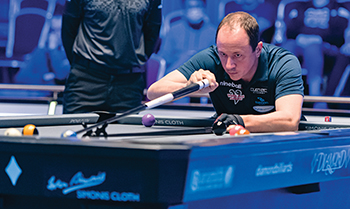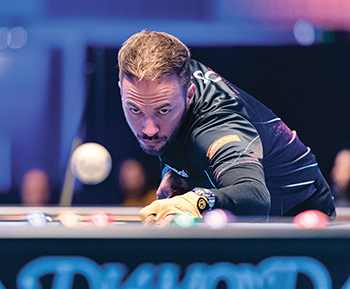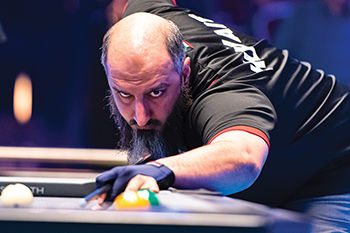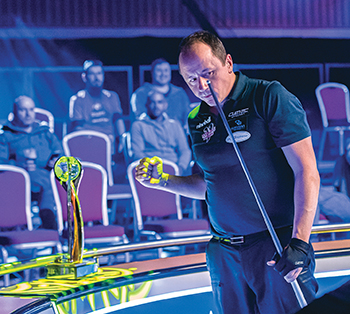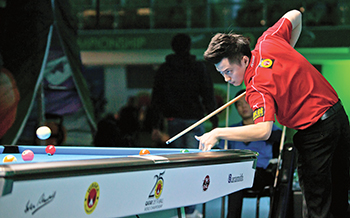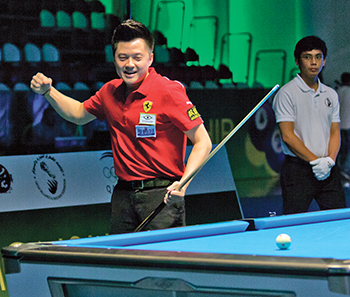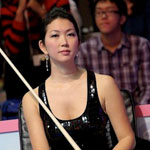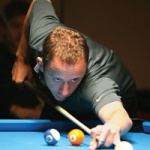No Worlds Left to Conquer
At 38, American Shane Van Boening finally claimed the one title missing from his trophy case — the World Pool Championship.
By Keith Paradise
Photos by Taka Wu
The night before the final day of competition in the World Pool Championship, Shane Van Boening slept like a baby — and maybe that should have been his indication.
“I felt like I slept the best that I ever could before the finals,” said “I just had a feeling that I was going to do well that day.”
Near the end of previous World 9-Ball Championships, Van Boening tossed and turned his way to something that resembled a couple of hours of sleep on paper but wasn’t particularly restful. This time, the 38-year-old American star guesstimated that he grabbed 10 hours of rest before rising for the final two rounds of play Sunday morning at Stadium MK in Milton Keynes, England.
Then again, nothing about this tournament had been going the way it had gone in previous years, so why should rest be any different? Throughout the five-day, 128-competitor event, Van Boening seemed to get just the right break at just the right time — or, as was the case in his round of 16 match against Ko Pin Yi, back-to-back breaks at just the right time. Whenever it seemed a player was about to take command against the South Dakotan, an untimely error would occur. Conversely, whenever Van Boening had a chance to seize on an open opportunity he rose to the occasion and shot more precisely than a Swiss timepiece.
Van Boening said he felt like a new person when he woke up and, by the end of the day, he was definitely a different one; a person who could finally add the title “world champion” as a prefix to his name, having survived a nip-and-tuck battle in the first half of his match with defending champion Albin Ouschan only to have another one of those momentum swinging shots lead to winning eight straight racks and coasting to a 13-6 victory. The World Pool Championship title, a title which had eluded the South Dakotan for a decade and a half, puts an exclamation point on a career that includes five U.S. Open 9-Ball Championships, four Derby City Classic 9-Ball titles, a pair of World Pool Masters crowns and more than a dozen U.S. Open 8-Ball and 10-Ball titles. Even before this championship, the only thing that was keeping him out of the Billiard Congress of America Hall of Fame is the fact that he’s too young, still three years from earning a spot on the ballot.
“I only have one thing left to say,” Van Boening said on the Tuesday after his victory. “That monkey is no longer on my shoulder.”
It was a monkey that had been there for so long and had been fed so often by Van Boening’s detractors that the primate could probably run a couple of balls himself. Sure, they’d say, “He’s won a lot in America but what about his record in world championships?”, completely overlooking the fact that Van Boening was one of the few American competitors at that time willing to challenge himself in international events. In consecutive years, Van Boening lost in the final, losing to Pin Yi Ko in 2015 and to Albin Ouschan the following year. In 2018, he finished third. Even in last year’s World Pool Championship, Van Boening appeared to be cruising along in the single-elimination phase when sparring partner Oliver Szolnoki came from behind to eliminate him in the round of 16. With younger players joining the circuit every year, it was understandable for American pool fans — and even Van Boening himself — to wonder if the window of opportunity was either beginning to close or had already been shut.
Van Boening opened double-elimination play with routine victories against Waleed Majid, 9-4, and Jan Van Lierop, 9-6, but struggled against Bahran Lofty in the opening round of single-elimination play, using a couple of pocketed 9 balls on the break gut out an 11-9, win. And when a resurgent Mika Immonen built a commanding 10-3 advantage in the race-to-11 round of 32, it looked like Van Boening’s chances for a championship would have to wait for another year.
“I thought it was over,” he said. “I was pretty much done.” As Immonen worked to clear the table in what could have been the final game, the 3 and 4 balls remained clustered in a corner. The former World 9-Ball Champion cut in the 3 ball and crisscrossed the cue ball across the table to try and land an angled position on the 4 ball. Instead, he bumped the object ball and left himself a straight-in shot down the rail, eliminating any hope of moving the cue ball to the other side of the table for position on the 5 ball, which Immonen ultimately overcut and missed.
“That’s when I told myself I’m not giving up,” said Van Boening. After a victorious safety exchange allowed him to cut the deficit to 10-4, the South Dakotan used back-to-back breaks and runs to chop the lead to 10-6. He would miss the 3 ball in the 17th rack but watched the cue ball roll to a safe spot, forcing his opponent to try a jump shot. After Immonen missed his attempt, Van Boening cleared the table once again to trim the lead to 10-7.
It seems no championship run in any sport is complete without some form of controversy or point of contention. Pool, with its myriad of breaking and racking rules, is rarely an exception to the rule. After Van Boening broke the balls in the 18th game, the official approached the table to remove the template rack that was being used in the tournament’s earlier rounds. The 9 ball settled near the plastic sheet, with the 1 ball slightly behind and to the side of it. Van Boening said the object ball was slightly hidden by the 9 but that he could see one-quarter of the ball. Rather than use a ball marker to mark the area where the 9 ball was, the referee opted to simply pick the ball up and place it back down again, much to the disdain of Immonen, who grumbled noticeably after Van Boening cleared the table to narrow the gap to 10-8. Van Boening, who was unintentionally blocking Immonen’s view of the table after the break, stated the 9 ball was placed back in its proper spot.
“You can’t really say that if you didn’t really see the 1 in the first place,” said Van Boening.
Immonen, meanwhile, said his main complaint was about officials touching and moving balls without the aid of a ball marker. Immonen took time prior to the next break to voice his displeasure with the referee. Viewers on social media immediately chastised Immonen for his protest.
“I just can’t fathom the audacity that people have,” Immonen said. “I just wanted to make a point that I don’t want him touching the balls without a marker.”
Van Boening forced an Immonen foul in the next game to trim the deficit to a single rack. Van Boening was feeling it. When he muffed position on the 7 ball by accidentally kicking the 9 ball into its path in the 20th game, he simply executed a rail-first cut shot to pocket the ball in the corner pocket to tie the match, 10-10. After breaking in the deciding rack, Van Boening executed a sharp cut shot on the 1 ball, a dicey 4 ball with the cue ball pinned to the rail, then hammered in a punch on the 5 ball that allowed him to crack a joke with the crowd when it landed. He finished off the rack to advance to the round of 16 while his opponent packed up his cues and wondered what could have been.
“I basically missed one ball and played two jump shots and two kick shots,” said Immonen. “If I get good position on the 4, I’m clear out. One positional error cost me the match. I just want that match to be remembered for the quality of play and not the questionable little details.”
Van Boening had survived to the final 16 but still wasn’t playing as well as he was capable of. Reflecting on his matches, Van Boening said he realized he’d forgotten a key ingredient: fun.
“I forgot that I need to have fun when I go and play in all of these tournaments,” he said. “To just take away the pressure on yourself and getting out there and playing the table and playing your game.”
He was given a bit more advice during the event that proved crucial. The morning after Van Boening’s comeback victory against Immonen, he had breakfast with longtime sparring partner Jeff Beckley. As they shared a long chat, Beckley reminded his old friend to stay positive and maintain composure throughout the whole match.
He would need all the positivity he could muster down the stretch as his route would include former world champion Pin Yi Ko, Jung-Lin Chang, considered among the best rotation players in the world, reigning World Pool Masters champion Alex Kazakis and defending World Pool Champion Ouschan. If a Hollywood writer had submitted this script, it would have been rejected as being over-the top as each competitor held some significance to Van Boening. Ko and Ouschan had both defeated the South Dakotan in world 9-ball finals, while Kazakis whitewashed Van Boening in the finals of the 2021 Masters, 11-0.
Opening the day against Ko, again Van Boening watched his opponent build an early lead, as the former World 9-Ball and World10-Ball champion led, 7-4, and was in the process of adding to his total with an open table. Once again, a fortuitous miss allowed the American back to the table. Van Boening completed the rack, then rifled in back-to-back 9 balls on the break to tie the match. From there, he ran through the final three games to gut out an 11-8 win.
“That’s pool,” said Van Boening. “I didn’t give up and just played the best I could, but he made more mistakes than I did, and I just took advantage of his mistakes.”
Next up was Chang, who won the International Open in 2018 and the Las Vegas Open 10-Ball tournament in 2020 but has experienced similar struggles in world championships. He reached the finals of the 2019 World 9-Ball but got bogged down by pressure and lost to Fedor Gorst. Van Boening also played the 36-year-old from Chinese Taipei in a gambling match last year in Texas and watched the effects pressure had on his opponent during the multi-day event. Van Boening’s plan was simply to get ahead early and watch the stress devour Chan, which is exactly what happened. Van Boening built leads of 5-2 and 7-3. Chang whittled away at the deficit both times and even cut the lead to 10-8 before handing the table back to Van Boening and losing, 11-8. Van Boening was heading to the semifinals the next day to face Kazakis (who had survived a hill-hill match against Szolnoki in the quarterfinals) and to bed for that good night’s sleep.
Playing in the second semifinal match of the morning, the American recovered from an early 3-2 deficit to jump out to a comfortable 8-3 lead. The Greek wasn’t finished, fighting back to cut the lead to 8-7.
With a chance to tie, Kazakis unleashed a powerful break which pocketed six balls. The problem for him was that one of those was the cue ball. Van Boening cleared the table to climb ahead 9-7, then used one more break-and-run and a combination shot to squeak out an 11-7 victory and earn his third shot at the title.
“Shane is an amazing player and very tough to beat,” said Kazakis. “I had some weird breaks that helped me to lose in that match but, overall, he played amazing against me.”
Heading into his championship match against Ouschan, Van Boening said he felt confident. He believed he was breaking better and had put together more multi-rack packages than anyone else. Add in the fact that the winner breaks format, changed from the previous year’s alternate break setup, favors a player like Van Boening and it was easy to see why he was feeling good about his chances.
That said, Ouschan didn’t win back-to-back Premier League Pool events, last year’s World Pool Championship and the International Open on good rolls alone. In fact, if anyone was playing better down the stretch in Milton Keynes, it was the Austrian. After opening with easy victories against Lo Ho Sum and Daniel Maciol, Ouschan gutted out an 11-6 win over Nicholas De Leon and an 11-8 decision against Mats Schjetne to secure his spot in the final 16.
From that point, the two-time World 9-Ball champion made it look easier and easier as he went, cruising past Thorsten Hohmann 11-5 and taking out Joshua Filler, 11-6, to advance to the semifinals where he met Abdullah Alyousef, a 20-year veteran who was following a similar pattern to countryman Omar Al Shaheen a year earlier. Last year Al Shaheen’s runner-up finish to Ouschan in 2021 was a watershed moment for players from the Middle East. This year it was Alyousef’s turn, as he upset Aloysius Yapp and Max Lechner to reach the final four.
“After Omar’s performance last year, a lot of things changed in Kuwait,” Alsousef said. “It motivated a lot of players, and the game grew up more and more.”
Unfortunately for Alyousef, Ouschan picked the semifinals to play perhaps his best match of the event, breaking and running four times in eight racks to build a commanding 8-0 advantage. The Kuwaiti cut the deficit to 8-3, but missed in the next game, allowing Ouschan to coast to an 11-3 win to secure a spot in the final.
“I put some pressure on myself because I was the person that people wanted to beat,” said Ouschan. “I played good enough to beat my opponent in most of my matches but when I got into the knockout stage I played better and better every game.”
In the title match, Ouschan took advantage of some early jitters by Van Boening to build a 4-2 lead. But theAustrian scratched on the break in the seventh rack and Van Boening cleared the table and tacked on a break-and-run to tie the match, then used a combination shot on the 9 ball to grab the lead.
Throughout the day, Van Boening had been experimenting to see which side of the table was better for breaking. Generally, he favors the right side but was struggling to put balls away from that area of the table throughout the day. In fact, two dry breaks against Kazakis allowed the Greek back into the match. So, when he broke in the 10th rack, watched as nothing fell, then sat and watched while Ouschan cleared the table to tie the score, a tactical decision was made.
“When I had a couple of dry breaks that’s when I said to myself, ‘I’m not breaking from this side anymore,” Van Boening said.
Now he just had to earn an opportunity to break again. The Austrian had laid down a safety which he was certain had locked up his opponent. Van Boening assessed the table, then unleashed a medium speed, one-rail kick which pocketed the 1 ball, then used a safety on the 2 ball to work his way out of the rack and tie the score, 6-6.
“That’s a kick you probably make one in 20 times at that speed,” said Ouschan. “After he made that I kind of said to myself, ‘God damn. What’s going to happen next?’”
Little did Ouschan know at that time that he wouldn’t really see another good opportunity. Van Boening earned seven consecutive racks to coast into the title, putting on a display of clutch shot-making and suffocating safety play down the stretch. He rolled to an 11-6 lead, while Ouschan could only look on with a bemused look on his face.
“I know the feeling when every detail goes your way,” he said. “I knew the chances of me making a comeback were very small.”
With the lead now 12-6 and a rack away from victory, Van Boening executed a push out on the 1 ball after the break. Rather than risk a miss or selling out the table to his opponent, Ouschan returned the table to Van Boening.
“I was surprised he gave that back because that was an easy kick safe,” said Van Boening.
“I had been sitting in my chair for 25 minutes,” said Ouschan. “The chances of me leaving a good safety were very small.”
After a Van Boening safety, Ouschan returned to the table and jumped in the 1 ball, only to leave himself another jump on the 2. The long jump resulted in both the 2 and the cue ball leaving the table, handing Van Boening ball-in-hand. As he worked his way through the final balls, Van Boening admitted that his emotions started to leak to the surface. A ball away from victory, Van Boening called for his attention and walked over to the championship trophy perched on a table in the corner of the playing arena. He reached toward the trophy and said to himself, “This trophy is mine.”
After pocketing the championship-winning ball (becoming the first American since Earl Strickland in 2002 to claim the title) and shaking hands with Ouschan, Van Boening climbed onto the Diamond table and let out a series of screams that had been over a decade in the making.
“I’m happy for him,” said Ouschan. “I know that he’s suffered a lot with the two finals in a row that he lost. After the match I saw his relief and I know how he felt. He did a great job and he’s a well-deserved winner.”
The day after his championship, Van Boening upgraded his flight home to first class, had a more than modest number of adult beverages at the airport bar and headed home — again, sleeping like a baby. Of course, it’s a little bit easier to sleep when there’s no longer a monkey on your back.
“That monkey has gone back into the forest,” Van Boening said with a laugh.
Immonen, Parica Elected to BCA Hall of Fame
 One year after missing induction into the Billiard Congress of America Hall of Fame by two votes in a special run-off against Jeanette Lee, Finland’s Mika Immonen overwhelmed the 2014 field to earn his spot in the sport’s hallowed hall, according to the United States Billiard Media Association (USBMA). Two-time world champion Immonen, 41, will be joined by 65-year-old Jose Parica, the leader of the “Philippines Invasion,” who was added to the ballot under recommendation from the Veterans Committee.
One year after missing induction into the Billiard Congress of America Hall of Fame by two votes in a special run-off against Jeanette Lee, Finland’s Mika Immonen overwhelmed the 2014 field to earn his spot in the sport’s hallowed hall, according to the United States Billiard Media Association (USBMA). Two-time world champion Immonen, 41, will be joined by 65-year-old Jose Parica, the leader of the “Philippines Invasion,” who was added to the ballot under recommendation from the Veterans Committee.
Born in London, raised in Helsinki, Immonen was Europe’s No. 1-ranked played at age 20. But his career really took off after he moved to New York City in 2000. He won the WPA World Pool Championship in 2001, back-to-back U.S. Open 9-Ball Championships titles (2008, 2009) and the World 10-Ball Championship (2009). During the 2000s, Immonen won 10 U.S. pro titles, and numerous international events.
Parica was the first top player from the Philippines to come to the U.S., when he entered the World Straight Pool Championship in 1978, six years before the arrival of Efren Reyes. He won his first U.S. pro title in 1986 (the Clyde Childress Open). After several years away from the game, Parica returned to win two Camel Pro Billiard Series titles in 1997, and was the tour’s top points-earner and Player of the Year.
Immonen and Parica will be formally inducted into the BCA Hall of Fame on Friday, Oct. 17, at the Chesapeake Convention Center in Chesapeake, Va.
“It’s an amazing feeling,” said Immonen, upon hearing the news. “You never really believe it until it’s real. Last year was interesting, obviously. But I’m a little beside myself right now. I’ve got goose bumps.”
Van Boening Tops at Super Billiards Expo
But with a new venue and new format, the champion remained Shane Van Boening. The reigning Player of the Year took his fourth Pro Players title, and second in a row, with an impressive run through a field of 61.
Starting with wins over Donnie Mills and Robb Saez, Van Beoning then ran into 2011 champ Ralf Souquet. The American dropped the second set, 8-6, but bounced back with a clinching 8-2 set to advance to the quarterfinals.
Souquet was hardly the only big name to be sidelined early. Efren Reyes drew German superstar Thorsten Hohmann in the first round — and the Filipino legend dropped consecutive sets to end an uncharacteristically quick event. Johnny Archer, Francisco Bustamante and Mika Immonen also crashed out before winning two sets.
In the quarterfinals, Van Boening took two close sets against Darren Appleton; Warren Kiamco edged Corey Deuel; Alex Pagulayan thumped Jeremy Sossei, and Hohmann outlasted Scotland’s Jayson Shaw.
In a rematch from the 2003 World Pool Championship, Hohmann took his spot in the final by edging Pagulayan. Van Boening then topped Kiamco in straight sets, 8-6 and 8-5, to take the other seat in the championship match.
Van Boening struck first in the final, taking the opening set, 8-6. He then worked his way to within a 10-ball of the title in the second when he got on the hill, 7-6. But Hohmann responded with a pair of racks to force a decisive third set.
In the final race-to-8, Van Boening turned a 3-2 lead into an insurmountable 7-2 advantage. Hohmann took a pair of racks to edge within shouting distance at 7-4, but Van Boening then broke and ran the 12th table for the 8-4 win.
His second consecutive Pro Players title netted Van Boening $10,000 while Hohmann pocketed $5,000 for his runner-up finish.
Appleton Loses Bid for Third U.S. Open
VIRGINIA BEACH, Va. — It goes without saying that you can’t win the U.S. Open 9-Ball Championship without a lucky break or two. In the case of Darren Appleton, who went unbeaten on his way to victories in 2010 and 2011, this year’s story took a turn with a very unlucky break. In a Thursday match with Efren Reyes, the Brit watched the Filipino legend fluke in the 9 in the case game. The loss sent Appleton to the left, where his pursuit of a third consecutive title would be much more difficult.
On Friday evening, that pursuit ended with an 11-7 loss to Dennis Orcollo. Like Mika Immonen, who chased the three-peat in 2010, Appleton showed championship mettle, but simply couldn’t muster the magic of the previous two years.
With the win, Orcollo earned a spot opposite Jose Parica in Friday’s last round of matches. The winner, as well as the winner of the set between Ronnie Alcano and Reyes, will be among the final four players to advance to Saturday.
While the eliminations continue, two unbeaten players — former champs Shane Van Boening and Alex Pagulayan — have punched tickets to Saturday afternoon’s hot-seat match. In his set with Parica, Van Boening struggled to get rolling at first. But he built a lead against the 63-year-old Filipino, and eventually ran away with the match, 11-5.
Pagulayan, meanwhile, sprinted to an early lead in his match with Reyes. Taking the first six racks, Pagulayan never relented in his pressure until he dropped the clinching 9 ball for an 11-5 victory.
Thirty-one Countries Vie for World Dominance in Wales
National pride is at stake at the PartyPoker.com World Cup of Pool, taking place now at the Newport Centre in Newport, Wales. Pressure is high as the scotch doubles matches are played on a straight knock-out basis.
The first round began on Aug. 22, with 32 two-man teams working together to represent their country. Thailand, represented by Tepwin Arunnath and Amnuayporn Chotipong, fell to Canadians Luc Salvas and Tyler Edey, 9-5. Team Qatar (Fahad Mohammadi and Bashar Hussain) was stymied by Malaysians Patrick Ooi Fook Yuen and Ibrahim Bin Amir, 9-3. And in an inter-continental contest, the Czech Republic, represented by Roman Hybler and Michal Gavenciak, defeated Poland’s Radoslaw Babica and Mariusz Roter.
The Phillipines, represented by Efren Reyes and Francisco Bustamante, were the clear crowd favorites, and rose to the occasion in round one, with a 9-0 massacre over Malta’s Tony Drago and Alex Borg. It was a tight battle between Taiwan’s Wang Hung-hsiang and Yang Ching-shun and India’s Dharminder Lilly and Alok Kumar. The tiny island nation prevailed, 9-6.
England has two teams in the running, one of which is represented by Steve Davis and Daryl Peach. It was 5-5 before the Brits were able to pull ahead of Jeong Young-hwa and Lee Gun-jae of Team Korea. On Davis’ 49th birthday, he joyously accepted their 9-6 victory.
In the second day of play on Wednesday, Aug. 23, Russia’s Konstantin Stepanov and Konstantin Zolotilov starved Hungary’s Vilmos Foldes and Gabor Solymosi of opportunities, defeating them 9-3.
Hong Kong produced a heroic performance to stun sixth- seeded Sweden in the biggest shock thus far in the PartyPoker.com World Cup of Pool. Sweden, whose side consisted of former World Championship finalist Tom Storm and former World Championship semi-finalist Marcus Chamat, had been 4-1, 6-2, and 8-5 ahead in the race-to-9. But the Hong Kong pairing of Lee Chenman and Kong Man-Ho showed their character to win the last four racks to secure a place in the final 16.
Team Japan, Maasaki Tanaka and Satoshi Kawabata obliterated Indonesia’s Imran Ibrahim and Ricky Yang, 9-0. While the English “A” team of Ronnie O’Sullivan and Raj Hundal, didn’t have it quite so easy against Spain’s David Alcaide and Rafael Guzman. The crowd was gutted as the duo fell to a fast 4-0 deficit, but had their hopes back up as England got their nose in front at 8-7, but the Spaniards took the final two racks to close out a famous victory.
Team U.S.A. is composed of Rodney Morris and Earl Strickland, who had a decided victory over Singapore. The home team, Rob McKenna and Ben Davies of Wales, disappointed their fan base with a heart-breaking 9-2 loss to Germany (Thomas Engert and Oliver Ortmann).
Today, Aug. 24, three matches are left to determine the final 16. This morning, Ireland had no luck against Finland’s Mika Immonen and Markus Juva, heading home after a 9-5 loss.
The first matches of round two will begin tonight, with No. 1-ranked Phillipines and No. 3-ranked U.S.A. taking on their respective opponents. For up-to-the minute coverage at www.partypoker.com!
IPT Round Three Complete
LAS VEGAS, Nev. – Despite some strong opposition from European players, including the surprising contingent of English 8-ballers, the always tough Filipinos are dominating the history-making IPT North American 8-Ball Open.
Virtually every Filipino competitor who started in the 200-player field has made it through to the 36-man fourth round of play – nine altogether, including three Pinoy hopefuls who needed to win qualifiers to gain entry to the $2 million tournament.
Leading the pack, as usual, was legendary Efren “Bata” Reyes, whose overall record stood at 12-1 after three days of round-robin play. No less impressive was the ball-control mastery of Filipino Marlon Manalo, who held an identical 12-1 record, along with Germany’s Ralf Souquet and Rafael Martinez of Mexico.
Third-round play began on Wednesday at the Venetian Hotel and Casino with the remaining 60 players divied into 12 groups of five. The top three in each group would advance to the fourth round on Thursday with a guarantee of at least $17,000 in prize money; the eliminated players would collect a still-impressive $10,000 each.
By 9:45 p.m., the lucky 36 were known. Their names follow, grouped by country, with their third-round records:
USA: Dee Adkins, 4-0; Jason Kirkwood, 3-1; Earl Strickland, 3-1; Cory Deuel, 4-0; Shawn Putnam, 3-1; Rodney Morris, 3-1; Larry Nevel, 3-1; Gabe Owen, 2-2; and David Matlock, 2-2.
Philippines: Efren Reyes, 4-0; Marlon Manalo, 4-0; Francisco Bustamante, 2-2; Dennis Orcollo, 3-1; Antonio Lining, 4-0; Rodolfo Luat, 2-2; Alex Pagulayan, 3-1; Santos Sambajon, 2-2; and Ronato Alcano, 2-2.
United Kingdom: Rico Diks, 2-2; Raj Hundal, 1-3; Daryl Peach, 2-2; Darren Appleton, 2-2; Mick Hill, 3-1.
Netherlands: Niels Feijen, 3-1; Alex Lely, 3-1; and Nick Van den Berg, 3-1.
Germany: Ralf Souquet, 4-0; and Thorsten Hohmann, 3-1.
Other countries: Quinten Hann (Australia), 2-2; Ivica Putnik (Croatia), 2-2; Mika Immonen (Finland), 3-1; Sandor Tot (Italy), 2-2; Yannick Beaufils (France), 2-2; Rafael Martinez (Mexico), 4-0; Evgeny Stalev (Russia), 2-2; and Marcus Chamat (Sweden), 3-1.
Here are some highlights from the round:
* The biggest eye-opener for many established players at the Open has been the success of the top competitors on the English 8-ball circuit, including perennial champions Mick Hill and Darren Appleton. Both will compete in the round-of-36.
“Us lads have come to play the top players from around the world, and I feel that we haven’t been given a chance,” said 26-year-old Hill. “The point that us English lads want to get across to everyone, including our own back home, is that we’re playing 8-ball, not 9-ball or straight-pool. … A lot of people don’t realize that the English players play 8-ball.”
Among their strengths are excellent cue ball control and solid stroke mechanics, said observers.
“Those guys shoot very straight, and I can respect that,” said IPT member Ike Runnels.
* Fifteen women started the competition on Sunday, and only former snooker stars Allison Fisher and Karen Corr were given much of a chance to advance. One woman was able to infiltrate the third round, and she was a U.K. native, but no one you might expect.
“I sort of in a way proved a point,” said Sarah Ellerby, who collected dozens of 8-ball titles in England before coming to the U.S. to compete on the WPBA Classic Tour. “…There wasn’t as much attention on me as on the other girls, and that’s fine.
“I’m sure that some of the guys were like, ‘The women won’t do well here,’” Ellerby said. “If I could break better, I feel like I could really make more of a dent. I think the women are capable enough to come here and do well.”
Unfortunately, Ellerby fell into a tough bracket in the third round and finished with a 1-3 record. Knowing she wouldn’t advance, Ellerby immediately left for the Las Vegas airport to catch an 11:30 p.m. United Airlines flight to Chicago. There, she would catch a limo for a two-hour drive to Peoria, the site of the WPBA Midwest Classic, which was starting play Thursday morning.
“I’m going to be very tired,” she said.
* Staying on the English for another moment, sharp observers might note that Raj Hundal advanced with a 1-3 record. It’s no misprint. Hundal was in a bracket with players who posted 4-0 and 3-1 records (Reyes and Strickland), leaving the other three players with 1-3 tallies. Of the three, Hundal had the highest games-won percentage (56.49 percent, just over American Gary Abood’s 55.09 percent), which pushed him into the next round. That 1.4 percent difference was worth at least $7,000.
“I’m in! I’m in!” the burly Hundal screamed upon hearing the results. “I’m freewheeling tomorrow! … I’m the luckiest [expletive] in the world!”
* Another surprise at the end of the day was how many players who were forced to qualify for the event ended up in the round-of-36. The 200-player field offered 50 qualifiers, and no fewer than nine made it into the fourth round. They included Filipinos Luat, Sambajon and Alcano.
* Most of the favorites remained in the running for the fourth round, with one major exception. American Johnny Archer faded in his bracket, finishing with a 1-3 record.
IPT Round Three: The Plot Thickens as the Field Thins
Round three starts today in the International Pool Tour’s North American Open and already 17,066 games have been played. Fatigue certainly played a role yesterday with 120 players facing a $5,000 difference in payout as they were whittled down to 60 in 12 straight hours of 8-ball action. The 60 remaining contenders who advanced to round three have been placed into 12 groups of five players each. Three players from each group will advance to the next round. The 24 who are eliminated will receive a lovely parting gift of $10,000.
Here’s a breakdown of yesterday’s highlights:
Mike Sigel was eliminated with a 2-3 record after losses to Marlon Manalo, Marko Lohtander and Quinten Hann. “The Mouth” settled for 61st and a $5,000 consolation prize.
The female players are near extinction, survived only by Sarah Ellerby who edged out Corey Harper by less than one percentage point in win average to advance to round three. Both Loree Jon Jones and Allison Fisher went winless in round two, and Gerda Hofstatter was eliminated with only one win.
Only eight players went undefeated throughout yesterday’s round, including three Americans: David Matlock, Nick Varner, and Charlie Williams. Also unscathed: Australian Quinten Hann, Filipino Santos Sambajon, Mexican Rafael Martinez, Mika Immonen of Finland, and Ivica Putnik of Croatia.
The Filipino contingent is now down three men, with Warren Kiamco and Gandy Valle eliminated after round two, and Jose Parica eliminated after round one. Still, 10 of the original 13 remain and most dominated their groups. Francisco Bustamante fell to Efren Reyes, but has the highest winning percentage of the entire field at 73.68 percent. (Johnny Archer is second with 70 percent.)
Snooker superstar Ronnie O’Sullivan held on by the skin of his teeth, with only two wins, but advanced on the merit of his winning percentage. On the other hand, Takeshi Okumura missed out on advancing by 0.03 percent to Larry Nevel.
Veterans Allen Hopkins, Kim Davenport, Keith McCready are all heading home. George San Souci and Tony Chohan went winless in round two. Other notables who are heading home with $5,000 consolation prizes: Danny Basavich, Jeremy Jones, George Breedlove and Oliver Ortmann.
Round three is upon us, and each player will play five matches among formidable fields. Here’s a quick analysis:
Ellerby will have to face two top Americans: Gabe Owen and Charlie Williams and two Filipinos: Marlon Manolo and Ronato Alcano. Good luck!
Earl Strickland is alive and well in the tournament, but grouped with Raj Hundal and Efren Reyes, the recently inducted Hall-of-Famer will have to fight hard to see another day.
German Thorsten Hohmann is by far the biggest name in his group, but will face Mick Hill, a promising British 8-baller.
Check out this group: Break-and-run Bustamante, Undefeated Ozzy Quinten Hann, 8-Ball Boy Wonder Karl Boyes, Prince of Pool Cory Deuel, and Bad Boy O’Sullivan. Yikes!
Mika Immonen and John Schmidt will face off in their group — undoubtedly there will be some good-looking pool played there.
Immonen Rises to Eminence at First Norwegian 9-Ball Challenge
The Norwegian 9-Ball Challenge, a first-time tournament, attracted several of the best players in the world including Tony Drago, Niels Feijen, Raj Hundal, Jasmin Ouschan and Marcus Chamat to Oslo, Norway, July 12-15. It was not surprising that two former World Pool Champions rose to the top, with Mika Immonen from Finland facing German Oliver Ortmann in the final. The pool powers that be were not on Ortmann’s side and Immonen was in top form, taking the title, 9-4.
The event took place at ElbowRoom, a posh poolroom in Oslo. The format divided the field into 16 groups in which a round-robin format was used. Almost half the field was dismissed by day three and a single-elimination format went into effect with the final 64.
Immonen took home $7,500 Euros for his efforts. Bronze medalists were Brian Beekers from Holland and Kurt Maflin from Norway.

